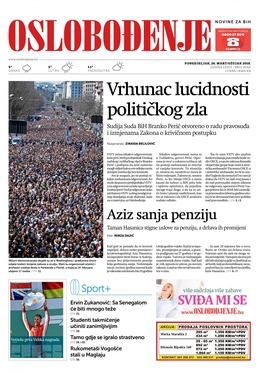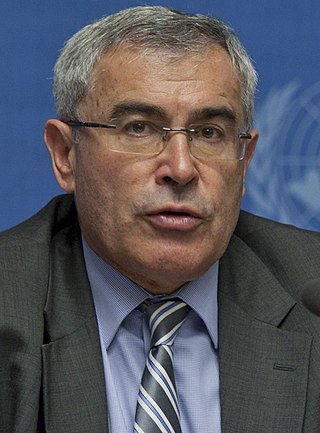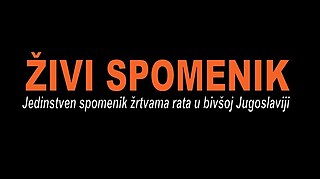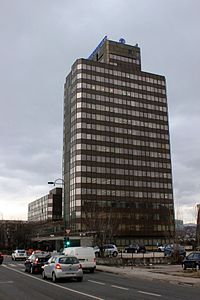
The economy of Bosnia and Herzegovina is a transitional, upper middle income economy. Bosnia and Herzegovina declared independence from socialist Yugoslavia on 1 March 1992. The main trading partners are Germany, Italy, Austria, Turkey and other neighboring Balkan countries.

Zenica is a city in Bosnia and Herzegovina and an administrative and economic center of the Federation of Bosnia and Herzegovina's Zenica-Doboj Canton. It is located in the Bosna river valley, about 70 km (43 mi) north of Sarajevo. The city is known for its Ironworks Zenica factory but also as a significant university center. According to the 2013 census, the settlement of Zenica itself counts 70,553 citizens and the administrative area 110,663, making it the nation's fourth-largest city.

Horde Zla is the organized Ultras group that supports Bosnian football club FK Sarajevo. The group's logo consists of a stylized depiction of the Grim Reaper, borrowed from a Zagor comic book at the time of the group's inception. Horde zla is one of two major football fan groups in Bosnia and Herzegovina. Apart from FK Sarajevo, the group also supports KK Bosna Royal and RK Bosna Sarajevo. The group's organizational structure is fairly decentralized with many subgroups present at the stadium's north stand – the gathering point of the club's most loyal and passionate fans. Some of the most well known subgroups are Outlaws, Maroon Brothers, Vutrasi, Fina Gradska Raja, Stara garda and Downtown.

Vogošća is a town and a municipality located in Sarajevo Canton of the Federation of Bosnia and Herzegovina, an entity of Bosnia and Herzegovina. The municipality is located about 6 kilometers north of the city of Sarajevo and is its secondary suburb, after Ilidža. According to the 2013 census, the town has a population of 10,568 inhabitants, with 26,343 inhabitants in the municipality.

The Oslobođenje is the Bosnian national daily newspaper, published in Sarajevo. It is the oldest daily newspaper still in circulation in the Bosnia and Herzegovina. Founded on 30 August 1943, in the midst of World War II, on a patch of territory liberated by Partisans, in what was otherwise a German-occupied country, the paper gained recognition over the years for its high journalistic standards and is recipient of numerous domestic honors and international awards in a branch.

Sven Alkalaj is a Bosnian diplomat who has served as Bosnia and Herzegovina ambassador to the United States since June 2023. He previously served as the Permanent Representative of Bosnia and Herzegovina to the United Nations from 2019 to 2023. Alkalaj also served as the country's Minister of Foreign Affairs from 2007 until 2012. He held the post of executive secretary of UNECE between 2012 and 2014 as well.

Emerik Blum was a Bosnian Jewish businessman, philanthropist and politician who served as the 26th mayor of Sarajevo from 1981 to 1983. He is known for being the founder and first director of one of Southeast Europe's largest conglomerates, Energoinvest.
The Sijekovac killings, also called the Sijekovac massacre, refers to the killing of Serb civilians, in Sijekovac near Bosanski Brod, Bosnia and Herzegovina on 26 March 1992. The assailants were members of Croat and Bosniak army units. The exact number of casualties is unknown. The initial reported number was eleven, while the Republika Srpska authorities listed 47, however, exhumations in Sijekovac carried out for two weeks in 2004 unearthed 58 bodies of victims, of whom 18 were children.

Bogić Bogićević is a Bosnian politician who served as the 5th Bosnian member of the Yugoslav Presidency from 1989 until its abolishment in 1992.
Božidar Matić was a Bosnian politician and academic who served as Chairman of the Council of Ministers of Bosnia and Herzegovina from February to July 2001. Additionally, he was Minister of Finance and Treasury during that period as well.
Hamdija Lipovača is a Bosnian politician. He served as the Premier of Una-Sana Canton from 1 February 2011 until his forced resignation three years later, following the violent protests and riots in Bosnia and Herzegovina. Lipovača was also the canton's Minister of Police. He previously served as the mayor of Bihać from 2004 to 2010.
Nož, žica, Srebrenica is a Serbian chauvinist hate slogan that glorifies the Srebrenica massacre of Bosniaks during the Bosnian War. The slogan rhymes in Serbo-Croatian and can be heard at football matches, by members of Serbian nationalist groups Obraz, the 1389 Movement and the Serbian Radical Party and in papers in support of Bosnian Serb General Ratko Mladić.

UDIK, the Association for Social Research and Communications, is a Bosnian non-governmental organization with offices in Sarajevo and Brčko. It was founded in 2013 by Edvin Kanka Ćudić. The organization aimed to gather facts, documents, and data on genocide, war crimes, and human rights violations in Bosnia and Herzegovina and the former Yugoslavia.

Living monument are the commemorations to the victims of wars in former Yugoslavia organized by the UDIK.
The Croat federal unit, Croat entity, or third entity, is a proposed federative unit in Bosnia and Herzegovina encompassing areas populated by Croats, to be created by the partition of the Federation of Bosnia and Herzegovina into Croat and Bosniak entities. The proposal is supported by the Croatian National Assembly, which includes the electoral representatives of Bosnian Croats. However, a detailed plan for its partition, including its borders, has yet to be finalized.

Senad Hadžifejzović is a Bosnian journalist, news anchor and TV host. He is best known for founding and running Face TV.

The M.T. Abraham group is an Israeli conglomerate headquartered in Tel Aviv. The group's portfolio consists of aluminium manufacturing, renewable energy, infrastructure development, real estate, commodities trading, logistics, and cultural investments. The group also runs the non-profit art institution M.T. Abraham Foundation.
Bosna Bank International d.d. Sarajevo, or simply BBI Banka, is a commercial bank serving Bosnia and Herzegovina headquartered in Sarajevo.












